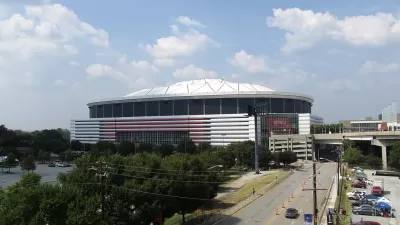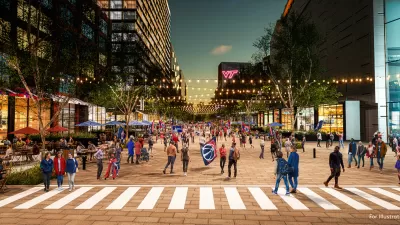HBO's John Oliver wants cities to do one thing when professional sports teams come asking for public money to build new stadiums: "Make them pay!"

"Most stadiums these days look like they were designed by a coked-up Willy Wonka," says John Oliver near the beginning of a recent segment that absolutely obliterates the recent history of professional teams taking pretty much whatever they want from cities to get the facilities they want. But Oliver's concern isn't the excess on display at these stadiums—it's the tremendous paid by taxpayers to build these new facilities.
Between 2000 and 2010, $12 billion went toward new facilities for professional teams, explains Oliver. In fact, since the 1990s, professional sports teams have a replacement rate of 90 percent. "Which begs the question," says Oliver: "Why?" Oliver can't find an answer to that question, citing a study that finds no evidence that stadium investments increase "jobs, incomes, or tax revenues."
Despite that lack of return on investment, almost every team gets something, according to Oliver. The New York Yankees, for instance, paid for their own new stadium—but it was built on land given rent and property tax free, costing the city hundreds of millions in lost revenue. May teams benefit from tax-free municipal bonds, which, as Oliver explains them, are usually spent on things like roads and schools. Among a slew of cities mentioned in the post for embarrassing capitulations to professional sports teams, Cincinnati stands out. Still paying back debts for stadiums built for the Bengals and Reds teams, Oliver notes that the taxpayers of the city are obligated to buy the Bengals a holographic instant replay machine—if and when such a device is ever invented.
Such are the lengths cities and their citizens are willing to go to for professional sports. But Oliver has a different idea: "We have to come to our senses, and stop signing these deals."
FULL STORY: John Oliver: It’s time to stop taxpayer-funded stadiums

Maui's Vacation Rental Debate Turns Ugly
Verbal attacks, misinformation campaigns and fistfights plague a high-stakes debate to convert thousands of vacation rentals into long-term housing.

Planetizen Federal Action Tracker
A weekly monitor of how Trump’s orders and actions are impacting planners and planning in America.

San Francisco Suspends Traffic Calming Amidst Record Deaths
Citing “a challenging fiscal landscape,” the city will cease the program on the heels of 42 traffic deaths, including 24 pedestrians.

Defunct Pittsburgh Power Plant to Become Residential Tower
A decommissioned steam heat plant will be redeveloped into almost 100 affordable housing units.

Trump Prompts Restructuring of Transportation Research Board in “Unprecedented Overreach”
The TRB has eliminated more than half of its committees including those focused on climate, equity, and cities.

Amtrak Rolls Out New Orleans to Alabama “Mardi Gras” Train
The new service will operate morning and evening departures between Mobile and New Orleans.
Urban Design for Planners 1: Software Tools
This six-course series explores essential urban design concepts using open source software and equips planners with the tools they need to participate fully in the urban design process.
Planning for Universal Design
Learn the tools for implementing Universal Design in planning regulations.
Heyer Gruel & Associates PA
JM Goldson LLC
Custer County Colorado
City of Camden Redevelopment Agency
City of Astoria
Transportation Research & Education Center (TREC) at Portland State University
Jefferson Parish Government
Camden Redevelopment Agency
City of Claremont





























